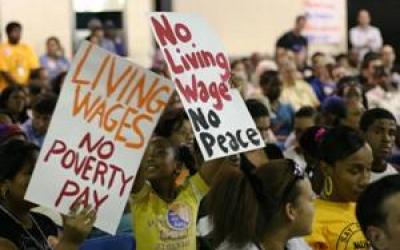 The National Development Plan (NDP) aims to eliminate all poverty and reduce inequality in South Africa by 2030 .[1] The poverty line used to benchmark poverty in the NDP is R418 per person per day in 2009 prices. According to the NDP, 39% of people living in South Africa in 2009 fell below this line. The objective is to reduce that to zero by 2030. However, alongside this very minimalist absolute poverty measure, the concept of an ‘acceptable standard of living’ or ‘decent living level’ has also been introduced in the NDP as a policy goal for the first time in any South African national policy document. The concept of a decent living level is informed by the multidimensional capabilities approach to development, and is to be realised progressively over time. Many would argue that this approach is far more beneficial as a foundation for the development of the necessary policies to address the rights- and development-based deprivations currently experienced by millions of people in South Africa than the minimalist poverty line. The NDP calls for a national debate to be held in order to build a consensus on what such a living level would include. The Studies in Poverty and Inequality Institute (SPII) and several of our partners are of the view that this is a critical conversation that should be nurtured in South Africa as a nation. We also believe, however, that considerations on what would constitute a decent living level must be consistent with the state’s obligations in terms of the transformative and restorative obligations contained in the Constitution of South Africa, including the socioeconomic rights, and the inalienable rights to equality, dignity and life.
The National Development Plan (NDP) aims to eliminate all poverty and reduce inequality in South Africa by 2030 .[1] The poverty line used to benchmark poverty in the NDP is R418 per person per day in 2009 prices. According to the NDP, 39% of people living in South Africa in 2009 fell below this line. The objective is to reduce that to zero by 2030. However, alongside this very minimalist absolute poverty measure, the concept of an ‘acceptable standard of living’ or ‘decent living level’ has also been introduced in the NDP as a policy goal for the first time in any South African national policy document. The concept of a decent living level is informed by the multidimensional capabilities approach to development, and is to be realised progressively over time. Many would argue that this approach is far more beneficial as a foundation for the development of the necessary policies to address the rights- and development-based deprivations currently experienced by millions of people in South Africa than the minimalist poverty line. The NDP calls for a national debate to be held in order to build a consensus on what such a living level would include. The Studies in Poverty and Inequality Institute (SPII) and several of our partners are of the view that this is a critical conversation that should be nurtured in South Africa as a nation. We also believe, however, that considerations on what would constitute a decent living level must be consistent with the state’s obligations in terms of the transformative and restorative obligations contained in the Constitution of South Africa, including the socioeconomic rights, and the inalienable rights to equality, dignity and life.









